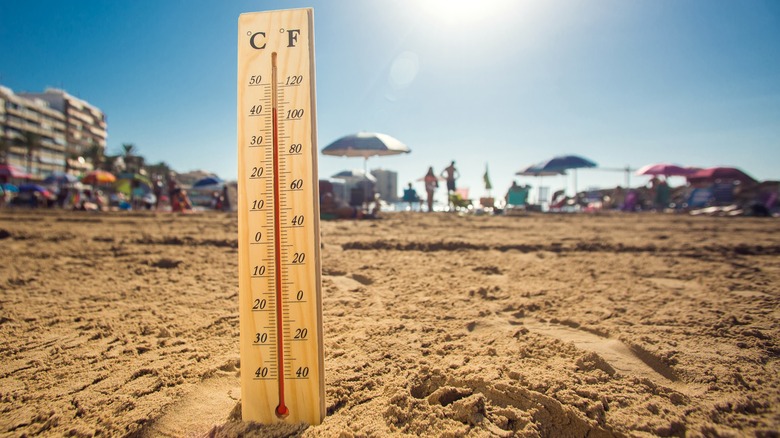Why Extreme Heat Can Be Dangerous For Your Heart
When the mercury on the thermometer kicks into triple digits, many of us crank up the air conditioning in our cars, seek shade while outdoors, and dream of the cooler months that seem so far away. Thanks to climate change, we're going to have to get used to hotter summers. According to the Environmental Protection Agency, heat waves in the United States are becoming longer and more frequent. Our heatwave seasons have also extended by 50 days since the 1960s. These days, heatwave seasons typically last more than 70 days. That's a lot of potentially hot days.
Extreme heat that lasts several days puts a lot of stress on your internal thermostat, according to Healthline. Your internal organs come under extreme stress, and this stress can put people with chronic conditions at a higher risk for death. A 2023 study in Circulation found that extreme heat combined with pollution from fine particles in the air puts you at higher risk for death from a heart attack.
Heat and air quality work synergistically
The study tracked more than 200,000 heart attack deaths over five years in China. People were more likely to die of a heart attack when temperatures reached extremely high or low levels. When the researchers incorporated air pollution into the equation, the risk of heart attack death from a four-day heatwave was twice as high compared to days with average temperatures and air quality. The study said that 2.8% of heart attack deaths could be attributed to extreme temperatures and unhealthy air quality, and women and older adults were more vulnerable to this risk.
An average heart is put under strain by extreme heat and poor air quality. According to Harvard Medical School, your heart needs to work much harder in hot temperatures to help your body shed excess heat and regulate your body temperature. The British Heart Foundation says that when you breathe in particles of pollution in the air, they can get into your lungs and heart, increasing the strain on your heart, narrowing your blood vessels, and making the blood more likely to clot. A heart attack occurs when a blood clot blocks the flow of blood to the heart.
Protecting your heart in extreme heat and poor air quality
The senior author of the study, Yuewei Liu, M.D., Ph.D. from Sun Yat-sen University in China, said in a news release that it's important to pay close attention to extreme heat and poor air quality to avoid harmful effects on your heart. Liu suggests strategies like staying hydrated and dressing properly for the extreme heat if you need to be outdoors. Using window blinds can help keep you cool while you're indoors. On days when fine particle pollution is high, wear a mask and choose more moderate workouts while you're outside.
The British Heart Foundation adds that you should go easy on alcoholic drinks and stay hydrated through salads and fruit. If you feel your heart working overtime in extreme heat, find shelter in a cooler area, recline with your feet up, and use cool water or ice packs to help cool your skin.



